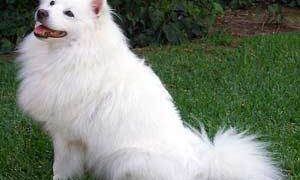“This post contains affiliate links, and I will be compensated if you make a purchase after clicking on my links.”
The American Eskimo Dog is a spitz type breed which originated from Germany in the 20th century. Spitz type dogs usually have curled tails, pointed muzzles, and pointed ears. There are many spitz breeds all over the world, and one of them is the American Eskimo Dog.
It was officially renamed from German Spitz during World War I, due to anti-German sentiments. Later it was officially welcomed to the United Kennel Club, and on July 1, 1995, it became American Kennel Club’s (AKC) 138th breed, having two national clubs dedicated to them: American Eskimo Dogs of America and National American Eskimo Dog Association.
These dogs are usually double-coated, with small eyes, rounded tips, smooth gait, and triangle-shaped pointy ears. The Eskie is a breed built specifically for cold temperatures and may also look like a sled dog, hence their name, “Eskimo Dog”.
Colors range from white to cream and biscuit-colored, although white is preferred by many. They have a strong body with a deep chest, and well-sprung ribs. Eskies also have a straight loin and muscular back. They have thick pads on their feet, designed for the winter.
Much like Akitas, their tail is curled with long hair.
Male Eskies have thicker and more lavish coats than female ones. They have a thick mane or coat around the neck, and they also have a thick and soft undercoat.
When they shed, many white particles are released from their coat, landing on rugs and furniture everywhere they go. Their top coat is much thicker because its purpose is to protect their skin from the harsh cold weather.
Their standard sizes are: 15 to 19 inches for male Eskies, and 14 to 18 inches for female Eskies. For miniatures, we have 12 to 15 inches for males and 11 to 14 for females.
Puppy classes usually have a minimum of 11 inches for males and 10 inches for females. AKC has these standards: 9 to 12 inches (toys), 12 to 15 inches (miniatures), and 15 to 19 (standards).
There are certain breed disqualifications, such as having blue eyes, because having them for a white dog means a bigger chance of hearing disabilities.
As for their temperament, they are a fun and loving breed for the family. They are very intelligence and loyal in guarding your home.
Eskies are high in energy levels, this is why one should train them with a firm method and keep them busy, otherwise they will become bored, annoying and destructive in the house.
They can also work out well for city dwellers, provided that they walk every day.
They enjoy being around people and learning new tricks, which makes them a good companion at home. They are known to be good with children.
However, there are some who were raised in puppy farms without proper breeding, and thus need to be thoroughly socialized.
Their coat needs brushing a few times per week to remove mats. A recommended tool to use would be the pin brush with blunt pins. They shed once per year, but may be more or less frequent for females.
Health problems among the breed include hip dysplasia, urinary tract and flea allergies. Also, they must be trained in a consistent manner, since they are hyperactive dogs.















Stephanie
Jun 10, 2014 at 3:20 pm
Great article, but I would say the advice to use ‘firm’ training methods with them might be leading people astray. Eskimos love to have FUN! Training should be positive and FUN FUN FUN! Otherwise, they are likely to rebell and go do their own thing. Frankly, even if they are well trained they are likely to ignore you if something better is going on, it’s just their way. Very independent! These are not dogs you should ever trust off leash. They are full of joy and happiness, and just love to be alive and be with their people. If you socialize them well as puppies, they will love people. I have had three, one which has passed on, and of the two I have now one is a certified therapy dog because he loves everybody, the other is a little more shy, but she didn’t get as good a start with socializing as the other one did. My previous eskie, also well socialized, loved everybody she met as well. For this breed it’s all about early socialization and positive, fun training methods that work WITH their joyful and carefree love of life. My eskies make me laugh and smile every day, they are very intelligent and always getting into trouble, so we call them ‘pesky eskies’. Anyone who wants one should be really patient, and have a great sense of humor, because you will need it!
Elle
May 29, 2013 at 1:01 am
I have an adorable male Eskie named Sundance 🙂 American Eskimo Dogs are very loving, playful, and loyal friends to you and your family. However, I want to point out that they are typically distrustful/aggressive toward strange people and dogs. An eskie might not be the best choice for a social person.
Jamie
Oct 28, 2016 at 11:02 am
Most Eskies are social animals. Your esky may just have issues with strangers . Mines loves em . Early socialization is also key to how they behave in the future but most eskies love other people & friendly with all dogs